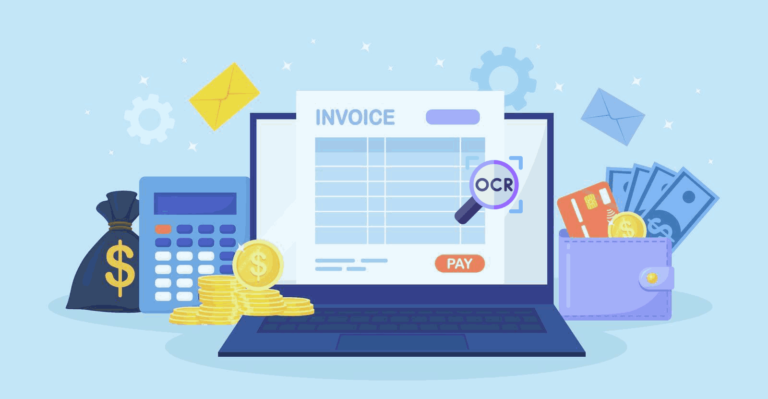Transforming Invoice Management - Confronting Industry Challenges with Innovative Solutions
In this blog, we explore the complex landscape of invoice management in industries, shedding light on the myriad challenges faced by businesses. From delays in payment processing to inaccuracies in financial records, strained vendor relationships, and hindered cash flow management, these challenges culminate in significant losses and hindered growth prospects. However, amidst these obstacles, innovative solutions emerged to revolutionize invoice management. We delve into the transformative power of automation, integration with government portals, streamlined approval workflows, and advanced technologies like OCR and AI. By addressing these challenges head-on and embracing innovative solutions, businesses can overcome hurdles, streamline operations, and achieve greater efficiency and success in invoice management.
What is Invoice Management?
Invoice management is the systematic process of receiving, reviewing, and processing invoices within an organization. It involves various steps to ensure accurate recording, timely payments, and efficient financial operations. The steps involved in invoice management typically include invoice receipt, data entry, approval workflow, payment processing, and record-keeping.

The Steps Involved in Invoice Management:
- Invoice Receipt: Invoices are received from vendors via various channels, including email, hard copy, or electronic data interchange (EDI).
- Data Entry: Invoice details like vendor information, invoice number, date, and item, quantity, amount are needed to manually enter in the accounting system or extract through automation tools.
- Approval Workflow: Invoices undergo a review and approval process involving different stakeholders within the organization, such as department heads or managers.
- Approval Workflow: Invoices undergo a review and approval process involving different stakeholders within the organization, such as department heads or managers.
- Record-Keeping: Invoices and related payment records are stored securely for future reference, audit trails, and compliance purposes.
Understanding the various types of invoices helps organizations categorize and manage their financial transactions effectively. There are various types of invoices used in business transactions, including:
- Standard Invoices
- Recurring Invoices
- Credit Memos
- Debit Memos
- Proforma Invoices
- Interim Invoices
Challenges:
Manual Invoice Processing:
Manual processing of invoices remains a labor-intensive and time-consuming endeavor within organizations. This outdated approach leads to extended approval cycles, resulting in significant delays in vendor payments and straining crucial relationships.
Data Entry Errors:
The manual input of invoice data is prone to errors, including inaccuracies in amounts, dates, and vendor information. Such errors can cause payment discrepancies, complicating reconciliation efforts and impacting financial accuracy.
Invoice Discrepancies and Duplicates:
Inefficient validation processes often result in discrepancies and duplicate payments, leading to financial losses and operational inefficiencies. Identifying and rectifying these errors requires extensive time and resources.
Lack of Invoice Visibility:
Limited visibility into the invoice lifecycle makes it challenging to track invoice statuses, monitor payment schedules, and forecast cash flow accurately. This lack of transparency hampers decision-making and resource allocation.
Inadequate Tracking Mechanisms:
Absence or inadequacy of robust tracking mechanisms leads to lost or misplaced invoices, causing processing delays and payment discrepancies. Ensuring accountability and traceability of invoices becomes increasingly challenging.
Unauthorized Purchases and Budget Discrepancies:
Unauthorized purchases made without adherence to procurement policies result in unrecorded expenses and budgetary discrepancies. Such unauthorized transactions strain financial resources and compromise compliance standards.
Exception Handling Challenges:
Incomplete or inaccurate invoices often require manual intervention for resolution, causing delays in processing and payment. These exceptions disrupt workflow efficiency, increasing processing time and hindering operational effectiveness.
Manual Follow-up and Communication:
Manual follow-up processes for overdue invoices are time-consuming and error-prone. Without automated reminders and notifications, there is a heightened risk of missing payment deadlines and damaging vendor relationships.
Uncertainty regarding input tax credit reports
The absence of integration with government portals, such as for generating reports like GST 2A & 2B, poses a significant challenge. Ensuring seamless integration and compliance with regulatory requirements is essential for accurate reporting and tax compliance.
Vendor Inquiry Management:
Addressing vendor inquiries regarding invoice status and payment timelines consumes valuable time and resources. Lack of transparency in the invoicing process strains vendor relationships and jeopardizes crucial business partnerships.
Delayed Approval Processes:
Delays in invoice approval due to manual routing and inefficient workflows prolong processing times, resulting in dissatisfaction among vendors and hindering business operations.
Solutions:
Automation of Invoice Processing:
Embrace automation technologies to streamline invoice processing, reducing manual intervention and accelerating payment cycles. Automated workflows ensure efficient routing of invoices for timely approval and payment.
Utilization of OCR Technology:
Implement OCR technology to automate data extraction from invoices, minimizing errors and enhancing accuracy. This reduces the risk of data entry errors and ensures correct capture of invoice details.
Enhanced Validation Checks and Reconciliation:
Implement automated validation checks and reconciliation processes to prevent discrepancies and duplicate payments. Integration with accounting systems ensures accurate recording of payments and reduces errors.
Implementation of Centralized Dashboard:
Deploy a centralized dashboard for real-time visibility into invoice statuses and payment schedules. This enhances transparency, facilitates better financial planning, and improves decision-making processes.
Development of Robust Tracking Mechanisms:
Establish robust tracking mechanisms to monitor the movement of invoices within the organization. This ensures accountability and traceability, minimizing the risk of lost or misplaced invoices.
Enforcement of Procurement Policies:
Enforce strict procurement policies and utilize spend management tools to control unauthorized purchases. Compliance with organizational guidelines prevents unrecorded expenses and budget overruns.
Integration of AI-Powered Analytics:
Integrate AI-powered analytics tools to identify patterns and anomalies in invoice data, facilitating proactive resolution of exceptions. This reduces manual intervention and streamlines resolution processes.
Utilization of Automated Reminder Systems:
Implement automated reminder and notification systems to streamline follow-up processes for overdue invoices. Scheduled reminders ensure timely action, reducing the risk of missed payment deadlines and penalties.
Integration with Government Portals:
Integrating with government portals, such as the GSP portal, is crucial for overcoming challenges related to generating reports like GST 2A & 2B. Our solution ensures seamless integration, enabling accurate reporting and compliance with regulatory requirements. By leveraging integration with GSP portal, our solution streamlines the process of generating GST reports, providing businesses with the necessary tools for efficient tax compliance and reporting.
Provision of Vendor Self-Service Portals:
Offer vendor self-service portals for invoice tracking and status updates, enhancing transparency and communication. Vendors can access real-time information, reducing manual inquiries and improving relationships.
Deployment of Electronic Approval Workflows:
Deploy electronic approval workflows to automate the invoice approval process, reducing approval lags and expediting payment processing. This ensures timely approvals and enhances operational efficiency.
In the intricate landscape of invoice management, industries confront myriad challenges, each contributing to a cascade of disadvantages for companies. These challenges encompass delays in payment processing, inaccuracies in financial records, strained vendor relationships, hindered cash flow management, and compromised operational efficiency. Such setbacks culminate in financial losses, damaged reputations, missed growth opportunities, and increased operational costs. Furthermore, inefficient invoice tracking mechanisms lead to lost or misplaced invoices, exacerbating processing delays and payment discrepancies. The absence of streamlined approval workflows not only prolongs processing times but also compromises vendor trust and satisfaction. Ultimately, these challenges pose significant obstacles to companies striving to maintain financial stability and competitive advantage in the marketplace.
By addressing these challenges through innovative solutions, organizations can streamline their invoice management processes, improve efficiency, and maintain strong vendor relationships. Embracing automation, leveraging technology, and enforcing best practices will empower businesses to overcome industry challenges and achieve success in invoice management.
Conclusion:
Invoice management is a critical aspect of financial operations, but it comes with its fair share of challenges. From slow processing to data entry errors and approval lags, organizations face numerous hurdles in managing invoices effectively. However, by implementing innovative solutions such as automation, OCR technology, and AI-powered analytics, these challenges can be overcome.
TantraMinds Solutions offers cutting-edge invoice management software equipped with advanced features to address industry challenges. From automated workflows to document tracking and vendor self-service portals, our solutions streamline invoice processing and enhance efficiency. Contact us today to learn more about how TantraMinds Solutions can revolutionize your invoice management processes.
Ready to revolutionize your invoice management? Contact TantraMinds Solutions today for personalized consultations and discover how our advanced solutions can streamline your operations, mitigate challenges, and drive unparalleled efficiency in your invoicing processes. Let’s transform your business together!
- Email: [email protected]
- Contact No.: +91 9325 934 935 / +44 7720 600 439
- Website: www.tantraminds.com

